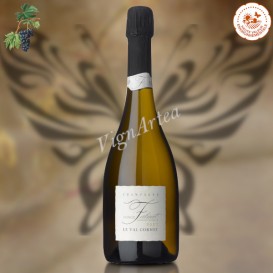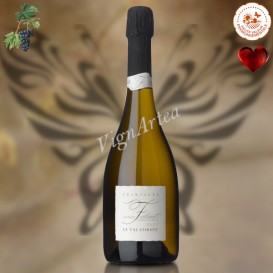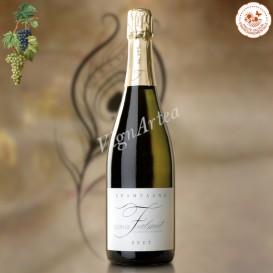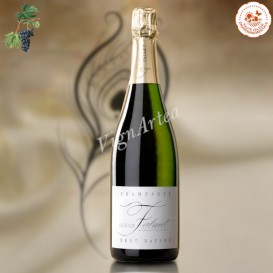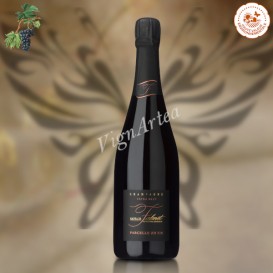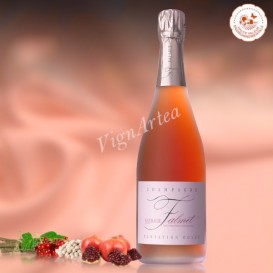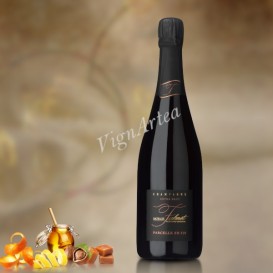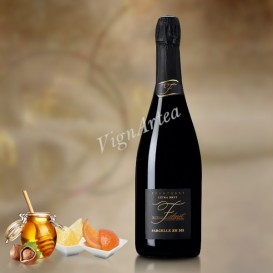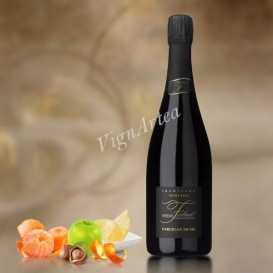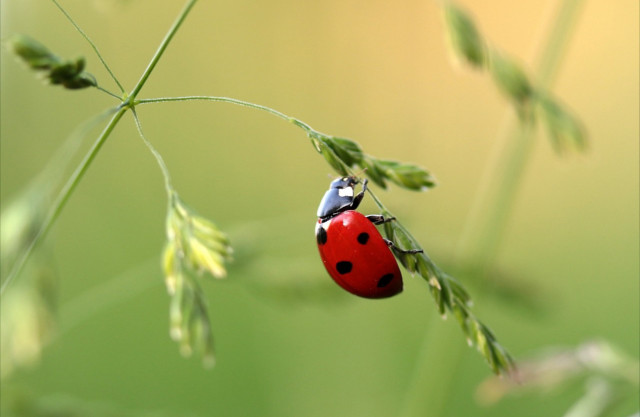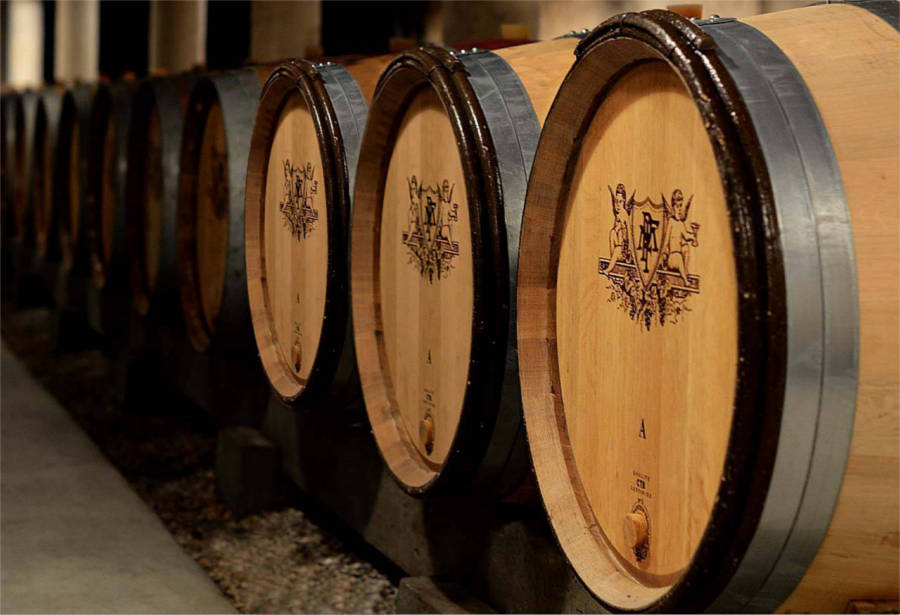Champagne Nathalie FALMET

CHAMPAGNE CÔTE DES BAR 3,4 ha Haute Valeur Environnementale WINEMAKER: Nathalie FALMET
ESTATE HISTORY
In Rouvres-les-Vignes, a small village in the Aube department located between Colombey-les-Deux-Eglises and the Cistercian abbey of Clairvaux, Nathalie FALMET works in her cellar, amidst oak barrels, stainless steel vats and clay amphorae, to produce gourmet champagnes that are renowned for their quality.
Nathalie FALMET is a rare woman winegrower in the country, she spent her childhood in the middle of the vineyards where she worked to help her father.
After studying chemistry at Orsay, she graduated as 'nose' in perfumery and opened her own laboratory in Bar-sur-Aube.
In 1993, she took over the family business and obtained her diploma in oenology: she then used her two skills, the oenological knowledge and the job as a 'nose', to make her champagnes as one would make perfumes.
She works with old Pinot Meunier, Pinot Noir and Chardonnay vines, and her cuvées, with the exception of the brut champagne, are not blended champagnes, as she wants to highlight the harvest: the champagnes are mainly wines from a single plot and a single year, but they are not vintage in the administrative sense of the term (official declaration, year engraved on the cork, etc.).
For her, a champagne is the result of three components: the terroir, the plant and also the winemaker, the latter having a considerable influence on the produced wine: "You can only love a wine by appreciating the person who makes it," she says.
Nathalie FALMET also wanted to show us the influence of the containers on the wine style: she gives us the possibility of comparing a Chardonnay made in 10 hl Tuscan jars (cuvée TERRA) with a Chardonnay made in 350-litre oak barrels (cuvée ZH 303); the difference, it is true, is surprising, we were able to realize it during the tasting!
It is the same for the Pinot Noir vines made in thermo-regulated stainless steel vats (Cuvée BRUT NATURE or in 350-litre barrels (Cuvée ZH 318 ).
TERROIR
The history of the region can be divided into three stages:
- the Jurassic (-199 to -145 million years ago), a period characterised by sedimentation subject to the so-called epirogenic tectonic influence, i.e. successive movements of uplift and sinking of the earth's crust which will have an impact on the different geological facies,
- the Tertiary period (66 to 3 million years ago), during which orogenic movements (formation of mountains) in the Mediterranean regions had an impact on the Champagne region with the formation of folds and faults,
- the Quaternary, a period of tectonic calm marked by some episodes of glaciation which resulted in continental deposits..
The terroir of Rouvres-les-Vignes is a soil dating from the Kimmeridgian (Upper Jurassic stage) and composed of alternating limestone and marl beds rich in fossils. Their sedimentation took place in a marine environment, as a vast sinking movement of the earth's crust caused a major marine transgression. The water depth then reached its peak, which favoured limestone deposits and a sedimentation of marls with Ammonites that can be found in the soils of Rouvres-les-Vignes.
The folds and faults formation of the Tertiary period allowed this Jurassic clay-limestone soil to come to the surface and form the bedrock of this vineyard.
WINEGROWING & WINEMAKING
"My philosophy of growing the vines, vinification and winemaking is of course the healthiest, as far as the respect of nature is concerned, but it also leads to a purity and unmatched quality of wine.", says Nathalie FALMET.
For this reason, she grows her vines according to the Sustainable Agriculture principles: treatments are only used in case of important cryptogamic attacks.
The grapes are vinified separately by variety and by plot.
Her desire to produce exceptional champagnes destined for a long cellar ageing will condition the entire winemaking process: no oenological products are used, with the exception of sulphites for the harvest and the use of neutral fermenting yeasts in order to let the grape variety and the terroir express themselves without restraints.
The absence of SO2 treatment during the various winemaking processes requires that all the champagnes undergo their malolactic fermentation for two reasons: the first reason is that stopping a malolactic fermentation requires the use of a large dose of sulphites, which is contrary to the estate philosophy, and the second reason is that it guarantees the microbial stability of the wine over time, which is essential for a long cellar ageing. In addition, in order the malolactic fermentation to take place in good conditions, the alcoholic fermentation must be completed beforehand without any incidents. In order to achieve a complete alcoholic fermentation without any risks of aromatic deviations caused by the development of undesirable microorganisms, Nathalie FALMET uses yeasts selected for their strong fermenting capacity and neutral, so that they have no aromatic influence during the fermentation; the only exception is the TERRA cuvée vinified in Tuscan jars, where she does not add any yeast, she lets the native yeasts work.
Once all the fermentations are complete, the champagnes are aged on slats for 18 months for the BRUT cuvée up to 6 years for the ZH 302 cuvée. After disgorging, no sugar is added for the vast majority of the champagne, so as not to influence the aromatic profile obtained. If sugar is added, it is done with a neutral liqueur d’expédition in order to bring a little sweetness to the champagne but without any aromatic influence.
Nathalie FALMET presents 9 champagnes:
- Three single-plot champagnes that bear the cadastral names of their parcels, ZH 302, ZH 303 and ZH 318, all made in 350 litre oak barrels, with one single variety from a single harvest.
- A single-plot champagne from a place called LE VAL CORNET, made half in barrels and half in thermo-regulated stainless steel vats from old Pinot Meunier and Pinot Noir vines with extremely low yields: 6,000 kg/ha, or 37 hl/ha, which guarantees a wide range of aromas and a long ageing potential.
- A Blanc de Blancs single-plot champagne made in large 10 hl terracotta jars from Tuscany: the TERRA cuvée. The influence of the jar is marked, the champagne is airy, delicate and of a rare complexity.
Nathalie Falmet also uses a 10 hl dolium to make the Pinot Noir, but she has not produced a specific cuvée for this grape variety and this container yet .For the moment, the Pinot Noir made in dolium is used in the composition of her brut champagnes. - A rosé champagne, TENTATION ROSÉE, whose skin maceration time is managed in the same way as for the Rosé des Riceys, i.e. with regular tasting until the desired taste is obtained. The latter can be obtained after a few hours, sometimes later, but the maceration never exceeds 48 hours. The press juice is not reintegrated, only the free-run juice is used.
- A Soléra cuvée, with the eponymous name and composed of a blend of Pinot Noir and Chardonnay from 7 different harvests.
- Two Brut champagnes, a Zero dosage Brut 100% Pinot Noir and a Brut with sugar addition and made from the three grape varieties of the vineyard with 20% reserve wine. It is in these two cuvées that the Pinot Noir made in dolium is added.
-
LE VAL CORNET 2017 (Champagne Nathalie FALMET)
60,00 € In stock!COTE DES BAR - AOP CHAMPAGNE - BLANC DE NOIRS CHAMPAGNE
Grape varieties: Pinot Noir (50%) - Pinot Meunier (50%)
Extra-Brut Single-Plot Sugar addition: 4 g/l
Winemaking in stainless steel tanks (50%) & 350-liter oak barrels (50%)- Nose: fresh and complex. Notes of candied citrus fruit, white flowers, praline and a hint of nutmeg.
- Palate: invigorating, elegant and very sapid.
- Tasting date: November 2023.
- OUR OPINION: magnificent, as always!
- Nose: fresh and complex. Notes of candied citrus fruit, white flowers, praline and a hint of nutmeg.
-
LE VAL CORNET 2020 (Champagne Nathalie FALMET)
60,00 € In stock!COTE DES BAR - AOP CHAMPAGNE - BLANC DE NOIRS CHAMPAGNE
Grape varieties: Pinot Noir (50%) - Pinot Meunier (50%)
Extra-Brut Single-Plot Sugar addition: 4 g/l
Winemaking in stainless steel tanks (50%) & 350-liter oak barrels (50%)- Nose: fresh and complex. Fresh citrus notes dominated by lemon and orange peel, notes of almond with a hint of anise.
- Palate: invigorating and tasty. Delicate bubbles. Lime finish.
- Tasting date: January 2024.
- OUR OPINION: this vintage has been matured on slats for a shorter period than its predecessors, giving it plenty of freshness and pep. The aromatic complexity that makes it so gourmet is still there. A real favorite! ❤️❤️
- Nose: fresh and complex. Fresh citrus notes dominated by lemon and orange peel, notes of almond with a hint of anise.
-
CHAMPAGNE BRUT - 21 (Champagne Nathalie FALMET)
37,00 € In stock!COTE DES BAR - AOP CHAMPAGNE - BLANC DE NOIRS CHAMPAGNE
Grape varieties: Pinot Noir (50%) - Chardonnay (30%) - Vin de réserve (20%)
Brut Sugar addition: 5 g/l
Winemaking in stainless steel tanks- Color: slightly pink.
- Nose: tasty and fresh. Brioche notes, aromas of pink grapefruit, redcurrant with a hint of grenadine.
- Palate: invigorating and energetic. Nice lemony structure.
- Tasting date: February 2024.
- OUR OPINION: despite the sugar addition, this vintage has a refreshing pep! Its slightly pinkish color is due to a very ripe harvest whose highly colored skins slightly tinted the juice at pressing time.
Other cuvée available:
The exceptional bottle's weight (1.8kg) may result in higher shipping costs for the final shopping cart.
- Color: slightly pink.
-
CHAMPAGNE BRUT NATURE R-2019 (Champagne Nathalie FALMET)
44,00 € In stock!COTE DES BAR - AOP CHAMPAGNE - BLANC DE NOIRS CHAMPAGNE
Grape variety: Pinot Noir (100%)
Brut Nature Single-Plot Sugar addition: 0 g/l
Winemaking in stainless steel tanks- Color: pale pinkish yellow.
- Nose: intense and delicious. Notes of citrus fruit and sweet spices with a hint of morello cherry.
- Palate: invigorating and rich, elegant and fresh. Very fine bubbles. Grapefruit finish.
- Tasting date: November 2023.
- OUR OPINION: an incredible charm! This 2019 harvest champagne is almost reminiscent of a light rosé, given its colour on the one hand and its delicately spicy aromas on the other. This particularity is due to the 2019 vintage whose very ripe grapes have slightly coloured the must.
Other harvest available:
The exceptional bottle's weight (1.8kg) may result in higher shipping costs for the final shopping cart.
- Color: pale pinkish yellow.
-
CHAMPAGNE ZH 318 - R 2018 (Champagne Nathalie FALMET)
124,00 € In stock!COTE DES BAR - AOP CHAMPAGNE - BLANC DE NOIRS CHAMPAGNE
Grape variety: Pinot Noir (100%)
Extra-Brut Single-Plot Sugar addition: 0 g/l
Winemaking in 350-liter oak barrelsTasty - Fresh - Sapid
- Nose: generous and brioche-like. Notes of bread dough, candied orange, lemon with a hint of coriander.
- Palate: well-balanced and energetic, gourmand and elegantly perfumed.
- Tasting date: March 2024.
- OUR OPINION: Gourmet, fresh and sapid vintage. For lovers of complex and aromatic champagnes.
Other harvest available:
The exceptional bottle's weight (1.8kg) may result in higher shipping costs for the final shopping cart.
-
CHAMPAGNE TENTATION ROSÉE - R 2018 (Champagne Nathalie FALMET)
48,80 € OUT OF STOCK!OUT OF STOCK!COTE DES BAR - AOP CHAMPAGNE - ROSÉ CHAMPAGNE
Grape varieties: Pinot Noir (50%) - Pinot Meunier (50%)
Extra-Brut Single-Plot
Winemaking in stainless steel tanks Sugar addition: 4,5 g/l- Nose: currants, grenadine, white pepper and licorice.
- Palate: round, tasty and slightly vinous. Fine bubbles. Intense finish.
Tasting date: February 2022
OUR OPINION: intense - fruity - spicy. This rosé champagne has a nice length and a great aromatic finesse.
The exceptional bottle's weight (1.8kg) may result in higher shipping costs for the final shopping cart.
-
CHAMPAGNE BRUT - 18 (Champagne Nathalie FALMET)
34,00 € In stock!COTE DES BAR - AOP CHAMPAGNE - BLANC DE NOIRS CHAMPAGNE
Grape varieties: Pinot Noir (50%) - Chardonnay (30%) - Reserve wine (20%)
Brut Sugar addition: 5 g/l
Winemaking in stainless steel tanks- Nose: tasty, lemon with a touch of white peach and some brioche notes
- Palate: fresh, thirst-quenching and balanced, with a nice lemony finish.
- Tasting date: February 2021
- OUR OPINION: fruity - fresh - thirst-quenching. Suitable for all palates.
Other cuvée available:
The exceptional bottle's weight (1.8kg) may result in higher shipping costs for the final shopping cart.
- Nose: tasty, lemon with a touch of white peach and some brioche notes
-
CHAMPAGNE ZH 318 - R 2014 (Champagne Nathalie FALMET)
115,00 € In stock!COTE DES BAR - AOP CHAMPAGNE - BLANC DE NOIRS CHAMPAGNE
Grape variety: Pinot Noir (100%)
Extra-Brut Single-Plot Sugar addition: 0 g/l
Winemaking in 350-liter oak barrelsTasty - Brioche - Tonic
- Nose: gourmet and intensely perfumed. Notes of brioche, honey, candied lemon and orange peel with a touch of caramel.
- Palate: tonic and invigorating. Fine bubbles.
- Tasting date: March 2021
- OUR OPINION: very nice champagne of gastronomy.
Other harvest available:
The exceptional bottle's weight (1.8kg) may result in higher shipping costs for the final shopping cart.
- Nose: gourmet and intensely perfumed. Notes of brioche, honey, candied lemon and orange peel with a touch of caramel.
-
CHAMPAGNE ZH 302 - R 2011 (Champagne Nathalie FALMET)
115,00 € In stock!COTE DES BAR - AOP CHAMPAGNE - BLANC DE NOIRS CHAMPAGNE
Grape variety: Pinot Meunier (100%)
Extra-Brut Single-Plot Sugar addition: 0 g/l
Winemaking in 350-liter oak barrelsComplex - Honeyed - Tonic.
- Nose: generous and complex. Clover honey, candied citrus, praline and roasted hazelnut.
- Palate: beautiful tension. Very fine bubbles and a long lemony finish.
- Tasting date: January 2021
- OUR OPINION: complex - honeyed - tonic. What an energy for this 2011 champagne with a beautiful aromatic complexity!
The exceptional bottle's weight (1.8kg) may result in higher shipping costs for the final shopping cart.
- Nose: generous and complex. Clover honey, candied citrus, praline and roasted hazelnut.
-
CHAMPAGNE ZH 303 - R 2014 (Champagne Nathalie FALMET)
115,00 € En stock !COTE DES BAR - AOP CHAMPAGNE - BLANC DE BLANCS CHAMPAGNE
Grape variety: Chardonnay (100%)
Extra-Brut Single-Plot Sugar addition: 0 g/l
Winemaking in 350-liter oak barrelsLively - Complex - Well-balanced
- Nose: fresh and complex. Brioche notes, praline, grilled hazelnut, candied lemon, tangerine, green apple and orange peel.
- Palate: tonic and perfectly balanced, with a very fine bubble.
- Tasting date: March 2021
- OUR OPINION: lively - complex - balanced. Very nice gastronomy champagne with a beautiful energy. Suitable for all palates.
The exceptional bottle's weight (1.8kg) may result in higher shipping costs for the final shopping cart.
- Nose: fresh and complex. Brioche notes, praline, grilled hazelnut, candied lemon, tangerine, green apple and orange peel.
- 1
- 2

